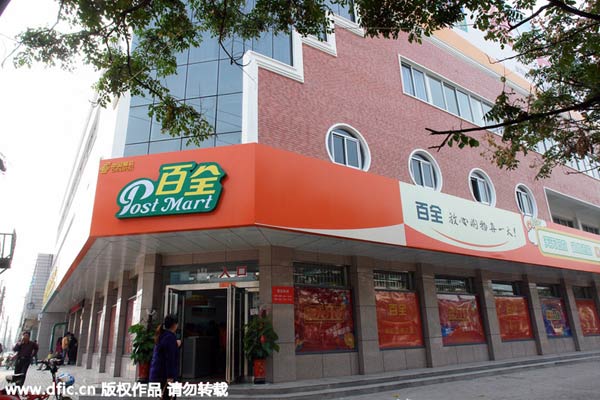Firm finds fertile fields for growth in rural areas, reports Wang Zhuoqiong in Xinzheng, Henan.
 |
|
Local Chinese residents walk past a PostMart supermarket in Xuedian town, Xinzheng city, Central China's Henan province, October 22, 2010. [Photo/IC] |
Dark and dusty, the retail store on the main street of Lijiuchang village in Xinzheng, a small city in Central China's Henan province, has three rows of shelves and a backroom full of fresh food-but its display of merchandise is chaotic.
It is the only grocery shop in a village of 1,500 households.
The store owner, a woman in her 50s, uses a computer provided by retail supermarket chain PostMart to keep track of her trading-it also serves as her cash register.
Many of her items, such as oil-sugar candies, stopped being popular around 20 years ago, but here they are still being sold in her store.
James Luo, chief executive officer of PostMart, a project backed by China Horizon Management LLC, is in the shop and asks the reporter a very telling question: "Do you notice how many brands you are using yourself, that are available here?" The answer is not many.
"That is our opportunity," he said. "We want to make what urban residents are already using become popular here too."
PostMart is jointly run by China Post and the US-based China Horizon Investments Group, and is a hybrid retailer, with strong logistics networks and international retail experience, and has been working hard to establish a growing presence in the often complicated Chinese rural market.
Luo is asked by the store owner how she could manage to get more deliveries of medium-and high-quality diaper brands. With tap water not nearly as available in villages as in cities, and heating in the winter far from widespread either, keeping cotton diapers clear is not easy.
Standing next to the shop's beverage counter, the owner said villagers have high recognition of well-known brands, such as Coca-Cola. In fact, "if they haven't heard of the brand, they are not interested", she said.
It is not price that determines whether the local people can buy a can of Coke here, it is reliable supply and availability, said Luo. "If adding 15 cents to the price means that water, for instance, can always be in stock, then the buyers are happy."
However, on any given day in this small shop, 40 percent of its most popular items are out of stock, and the reason is simple.
